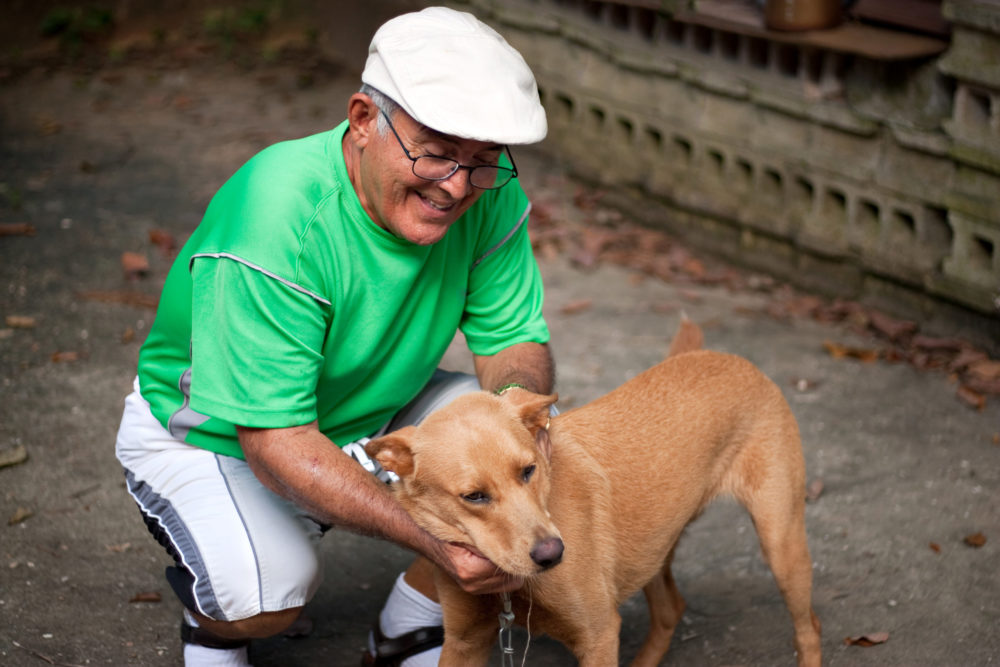In the U.S., 48 million households own an average of 1.6 dogs, which makes dogs the no. 1 pet in the country. Dogs hold the top spot even among elderly pet owners too. According to the National Poll on Healthy Aging, 55% of the national sample of adults ages 50–80 surveyed by the University of Michigan reported owning a pet, with 68% of these pet owners having a dog.
Why do the elderly prefer a dog over other types of pets? Well, because having a canine companion has many benefits. In general, dogs help people in their old age live a happier, healthier and active life.
Benefits of Owning a Dog
Let’s break down how having a pet dog can help the elderly improve their physical, psychological and social health.
- Having a pet dog increases an elderly’s physical activity. 78% of dog owners who participated in the National Poll on Healthy Aging reported that their pets helped them become physically active. Because most dog breeds need to be walked, dog-owning older adults will most likely be outside getting more steps per day than those without a pet dog. One study found that dog owners who walked their dogs were 34% more likely to meet the American Heart Association’s recommended 150 minutes of walking per week.
- Dogs reduce stress. According to The National Poll on Healthy Aging, 79% of pet owners said their pets reduce their stress levels. Specifically, other studies have shown that petting a dog decreases blood pressure. In addition, The National Poll on Healthy Aging also found that pets help make their owners feel loved (86%) and help them enjoy life (88%), thanks to relationships with them being less complicated than relationships with people.
- Pet dogs help older adults maintain a healthy heart. Overall, caring for a pet dog improves the owner’s cardiovascular health. A recent Mayo Clinic study found that dog owners were more likely to exercise, eat healthily and practise other heart-healthy lifestyle habits. Research has also shown that dog owners are 31% less likely to die from a heart attack or stroke than those who don’t own a pet dog. In addition, having a dog at home also reduced the risk of death by 65% for people with prior heart events.
- Having a dog is good for the brain. Because pet ownership increases physical activity and reduces stress, having a pet could help slow cognitive decline in older adults. A recent study suggests that owning a pet for five years or more may delay aging in the brain or protect against cognitive decline in adults around the age of 65 compared to those without pets.
- Dogs help the elderly connect with others. Owning a dog means older people can have a companion at home. Plus, dog walking can become an opening for social interaction with other people, with 65% of pet owners reporting in The National Poll on Healthy Aging that their pets help them connect with other people. In other words, a pet dog can be a people magnet that sparks conversations and new friendships.
- Dogs reduce feelings of isolation and loneliness. A study found that social isolation increases the risk of dying by 30%. But, because of the companionship that dogs offer and their help in establishing connections with other people, dog owners are less likely to feel lonely or isolated than non-dog owners.
- Dogs provide older adults with a sense of purpose. The National Poll on Healthy Aging found that 73% of adults aged 50–80 report their pets as giving them a sense of purpose. Caring for a dog provides structure to each day, and dog owners need to have self-discipline to maintain a routine, which helps keep their mind sharp and offers them a sense of purpose. This motivation to get up and care for their dog keeps seniors motivated and active.
- A pet dog is a good source of emotional support. Like people, dogs can “read” emotions and respond to their owner’s voice and actions. In addition to helping their owners feel loved and less lonely, pet dogs can also increase an elderly’s safety and independence by providing guidance or balance while walking, for instance.
The National Poll on Healthy Aging also found that 60% of pet owners believe their pets help them cope with physical and emotional symptoms, including taking their mind off pain (34%). Their doggie’s presence, not to mention all that petting and cuddling, releases feel-good hormones that can take a dog owner’s mind off any pain they might be feeling.
How to Choose the Best Dog for Older Adults
Caring for a dog when you’re older can be harder compared to when you were younger. Unlike young people, older adults might have mobility issues, health problems and other obstacles hindering them from properly taking care of a pet dog. So, before getting one, an elderly should take into account the following considerations in their decision.
- Previous pet ownership experience and commitment. Older adults who had a pet when they were younger will be better prepared or know what to expect from owning a dog. This includes the level of commitment you’ll need to take care of a pet dog.
- Health and mobility issues. Health or mobility issues can hinder older adults from properly taking care of a pet dog. Those with mobility issues, for instance, should remember that most dog breeds need to be walked.
- Dog age. Dogs live up to 14 years, on average, and experts recommend seniors to get a middle-aged dog, i.e., a big dog between 5 and 7 years or a small dog between 8 and 10 years. At 7, dogs are considered seniors and typically would rather sleep and eat at home. Meanwhile, a young pup would be too energetic and a super-senior dog might be too sickly—both of which can be too overwhelming for older adult pet owners to handle.
- Dog size. A small dog weighs between 8 and 20 pounds, and they are easier to handle than, say, a 50-pound dog. Bigger dogs might also be more difficult to walk, i.e., they’ll walk you instead of the other way around, and they’re also heavier to lift.
- Dog temperament. Small dog breeds have high energy and can be yappy, while a Doberman or rottweiler can be aggressive. The American Kennel Club (AKC), a registry of purebred dog pedigrees in the U.S., has a useful resource where you can learn about the characteristics of different dog breeds.
- Where you live. If you’re living in your own house, is it dog-proofed? If you’re living with family or other caregivers, can you rely on them to help take care of your dog? Or, if you live or plan to live in a senior or assisted-living community, do the rules allow you to have a dog?
- Cost of being a dog owner. From food to vet bills to toys and supplies, owning a dog can put a strain on your budget. Specifically, acquiring a dog can cost $2,100 and $2,500 annually, on average, according to the AKC.
If owning a pet isn’t feasible right now, you can volunteer at your local animal shelter or consider getting regular visits from a therapy dog instead. You’ll still get the benefits but without full-time commitment of being a dog owner and its corresponding cost.





